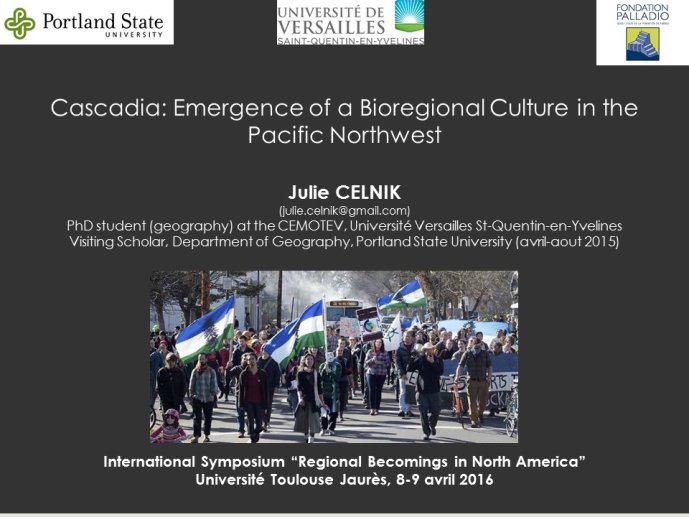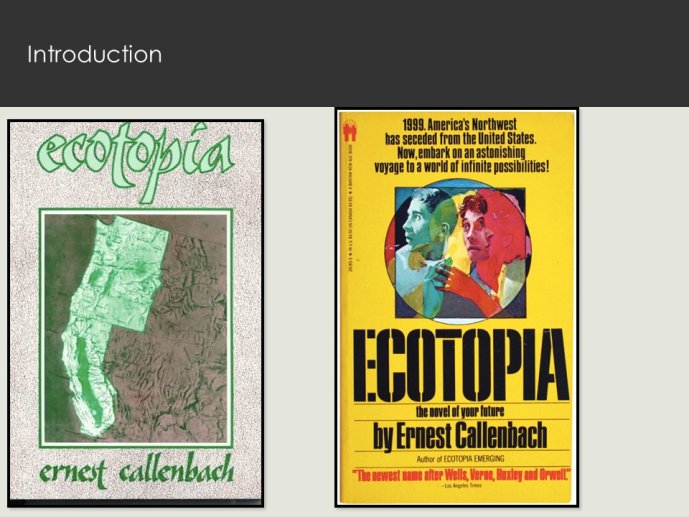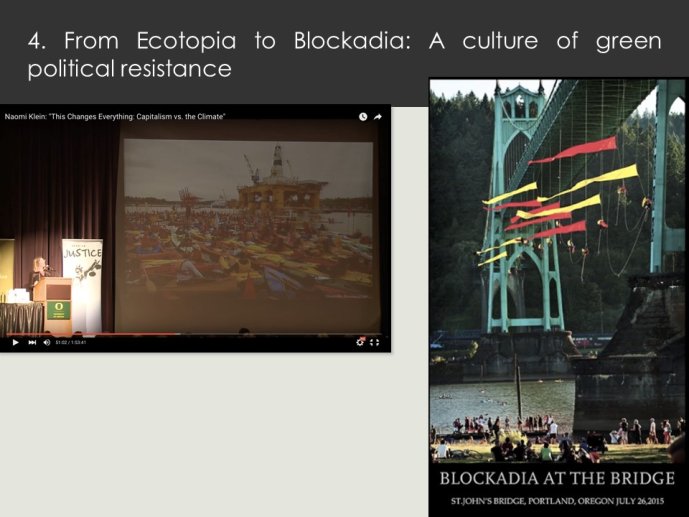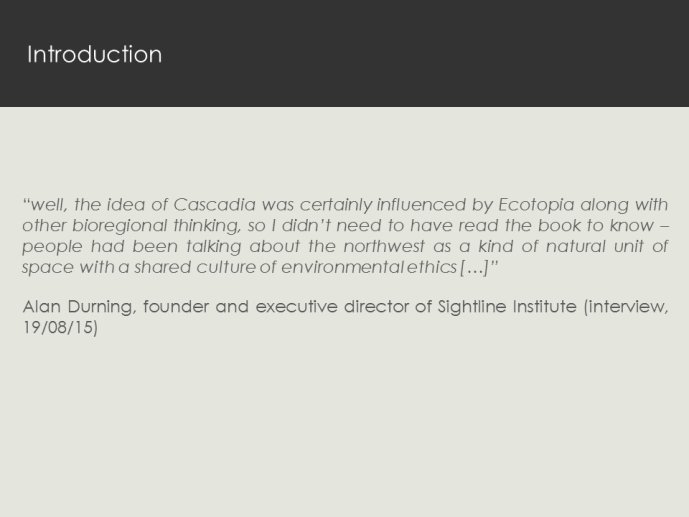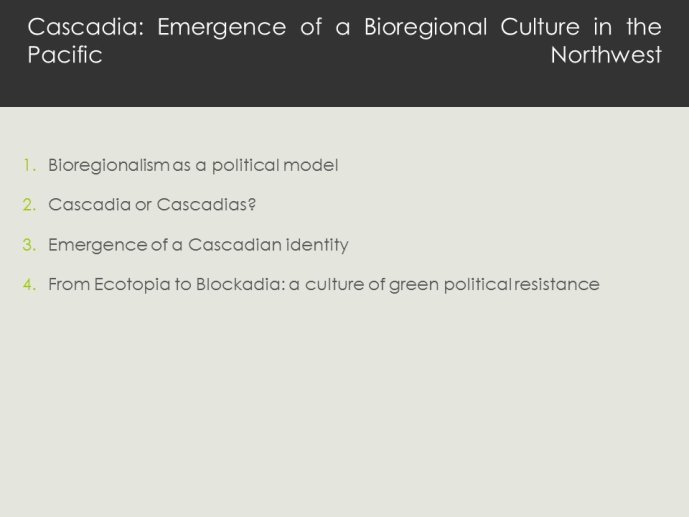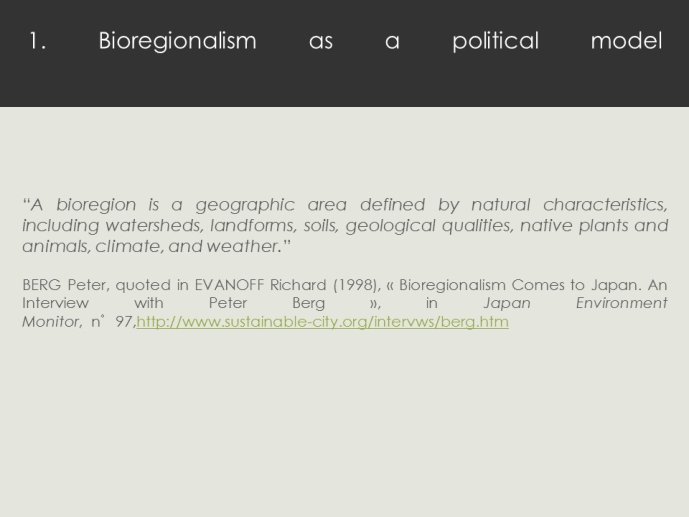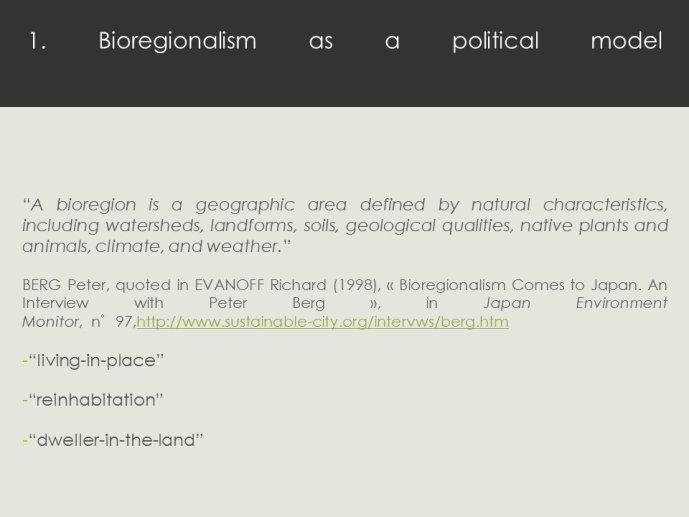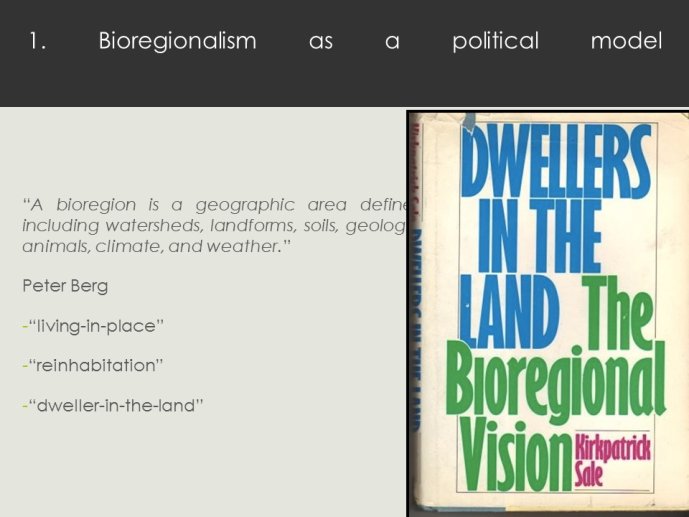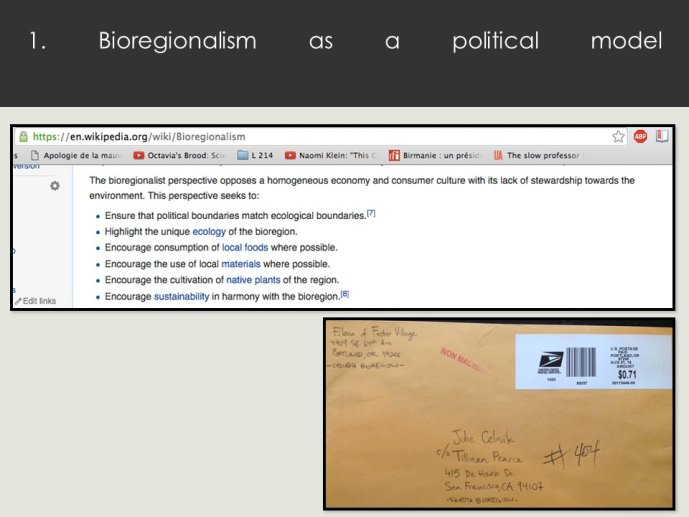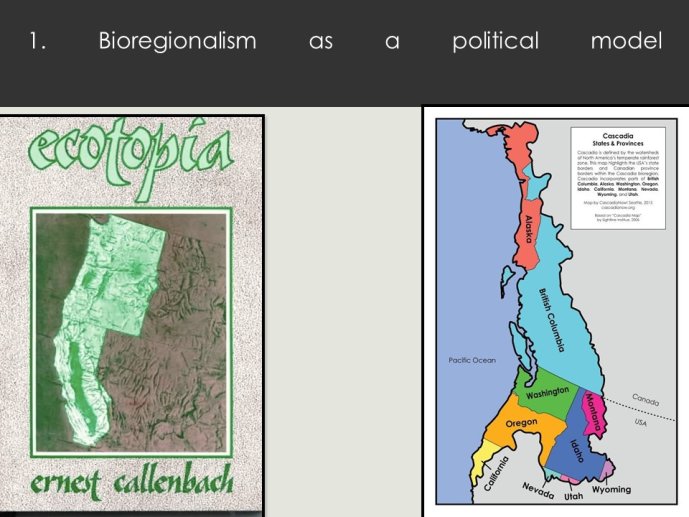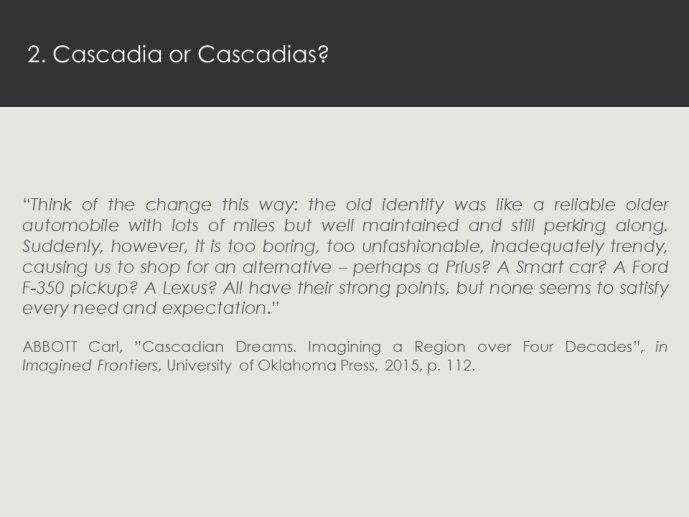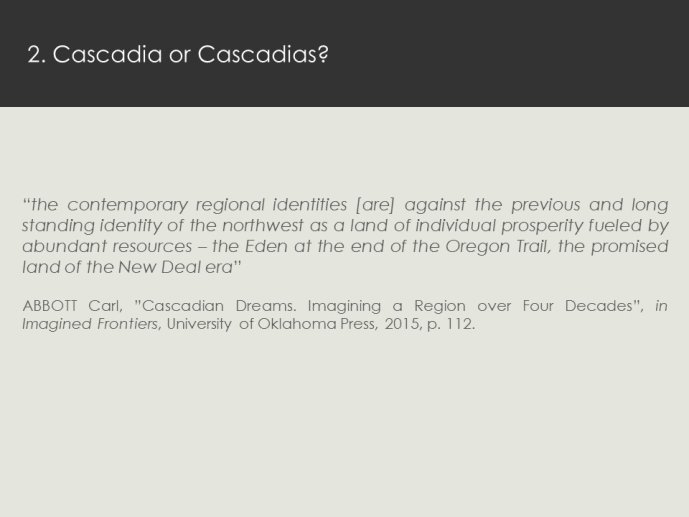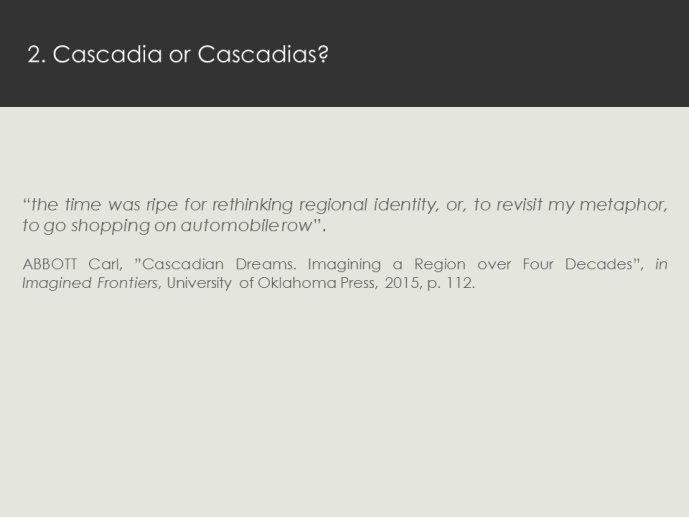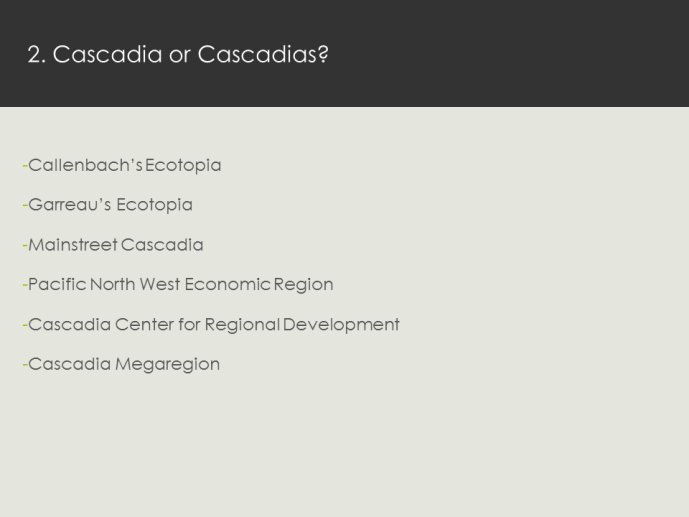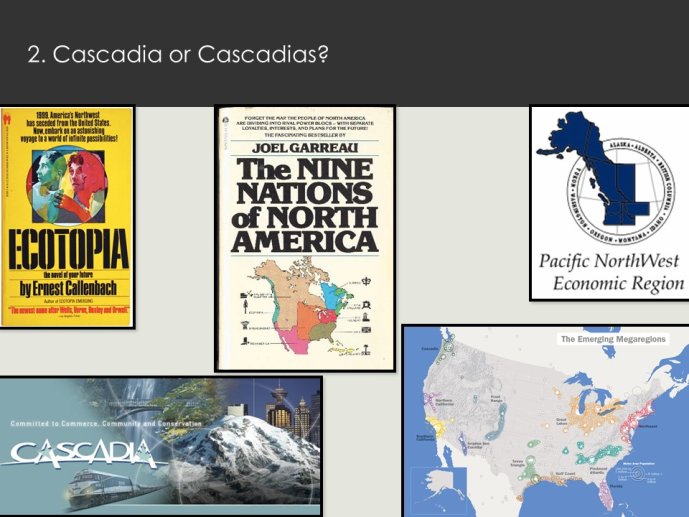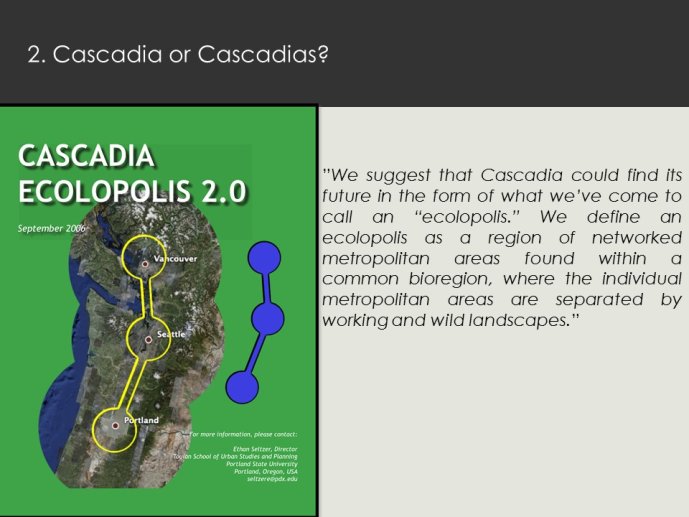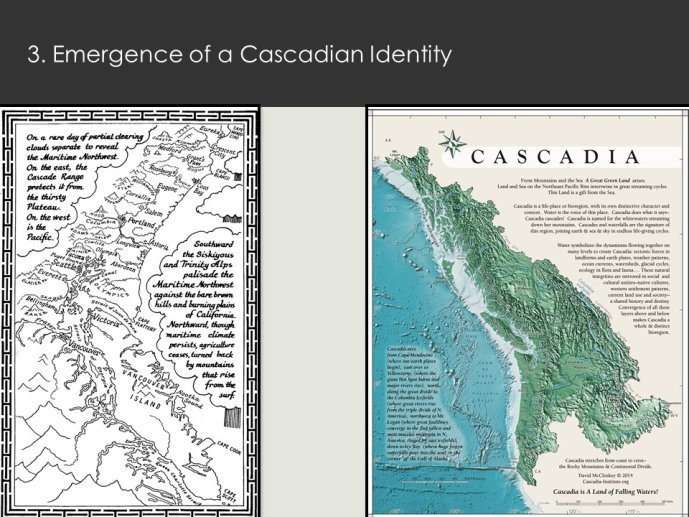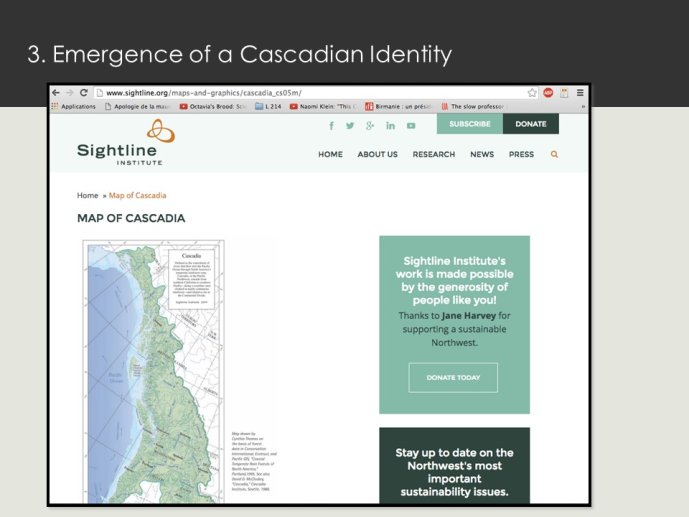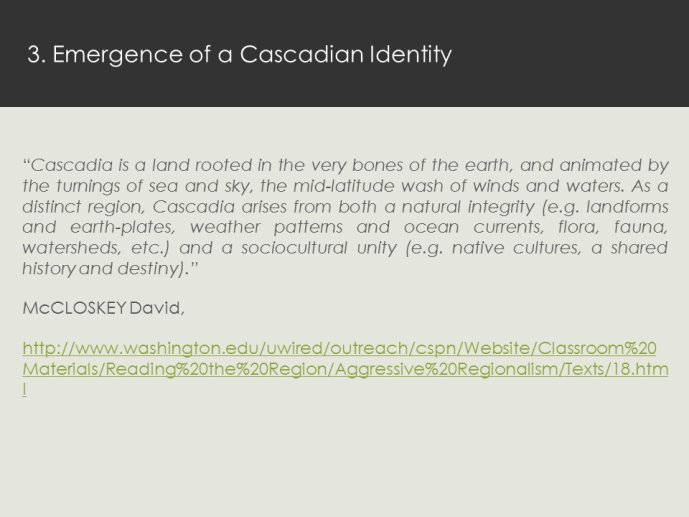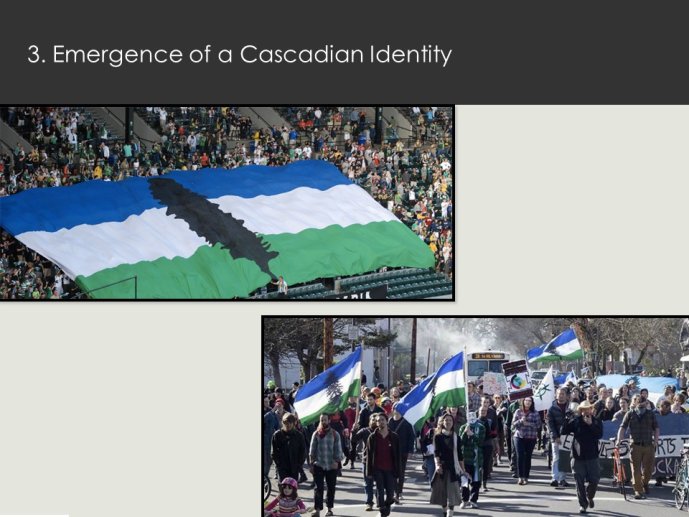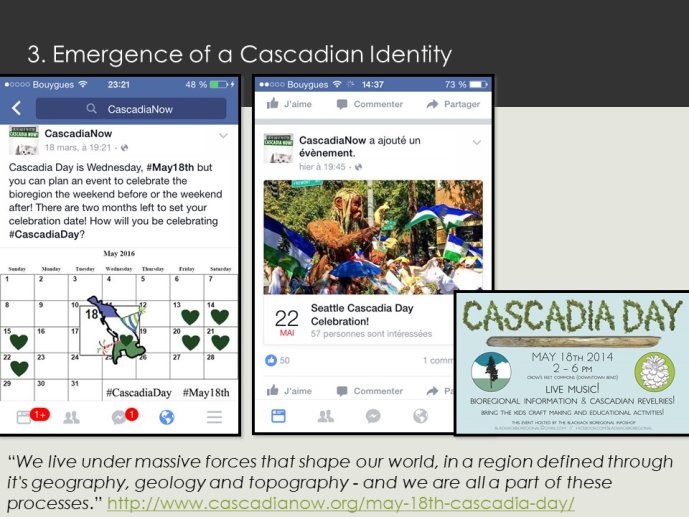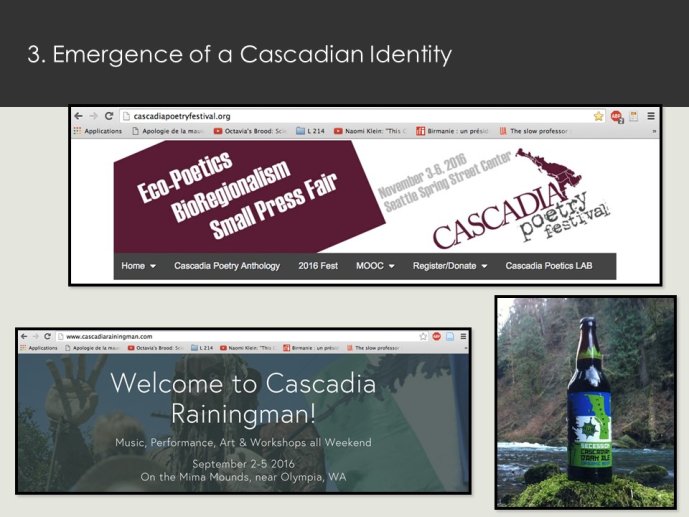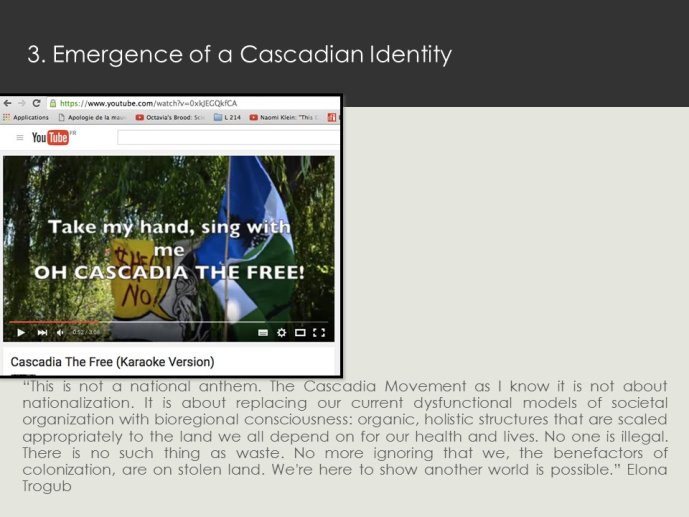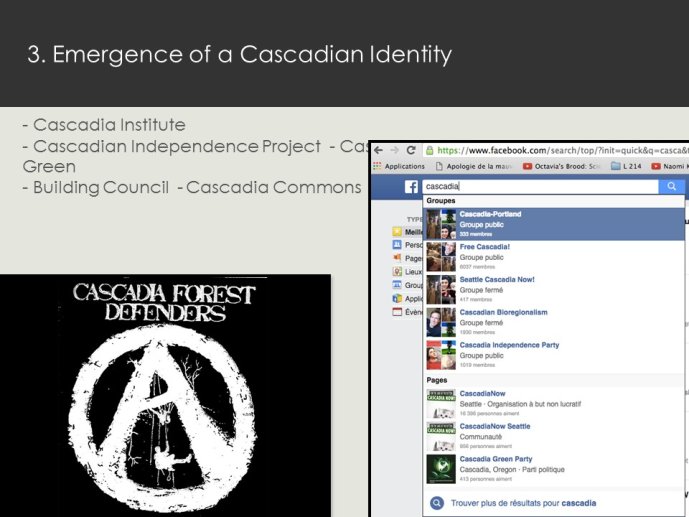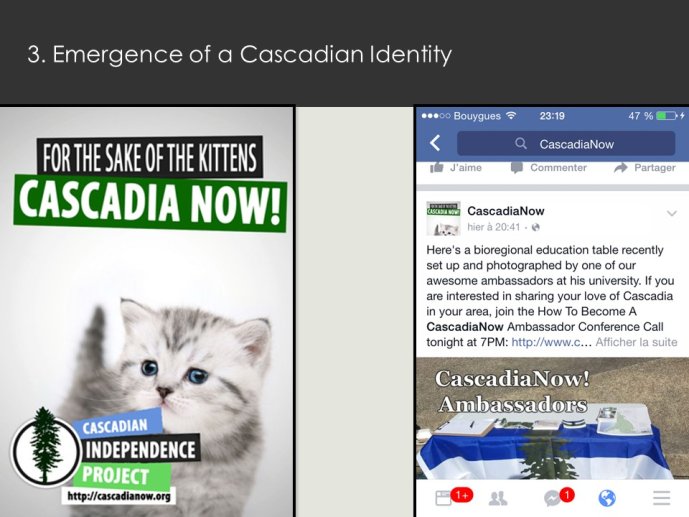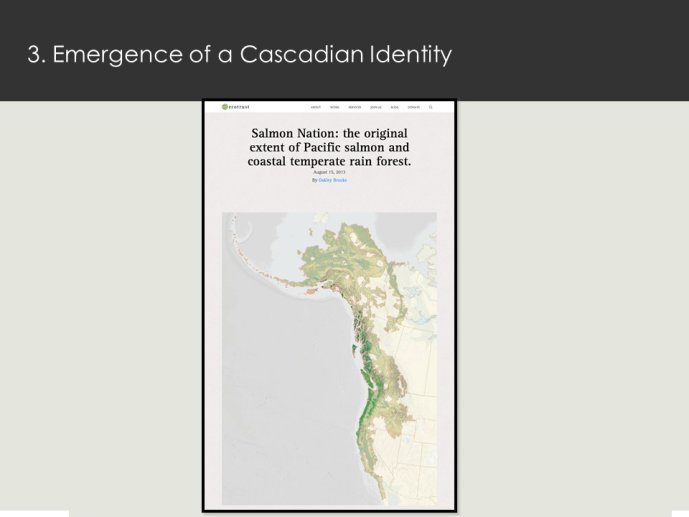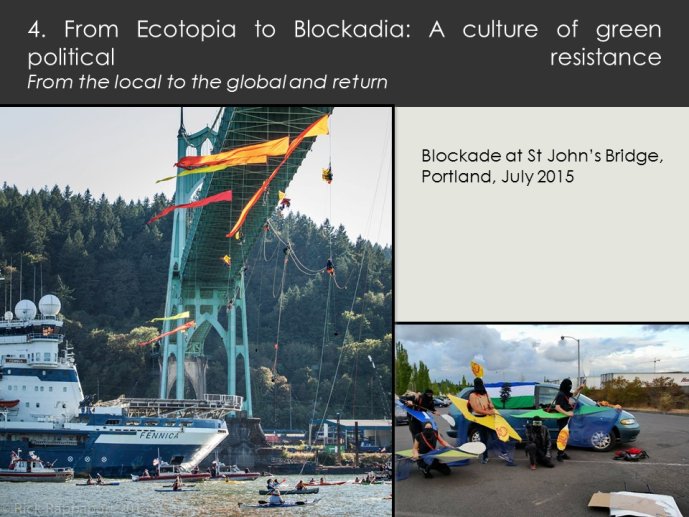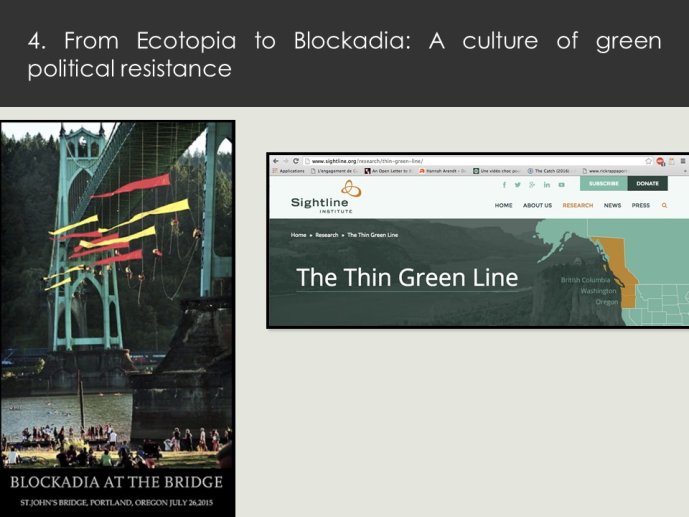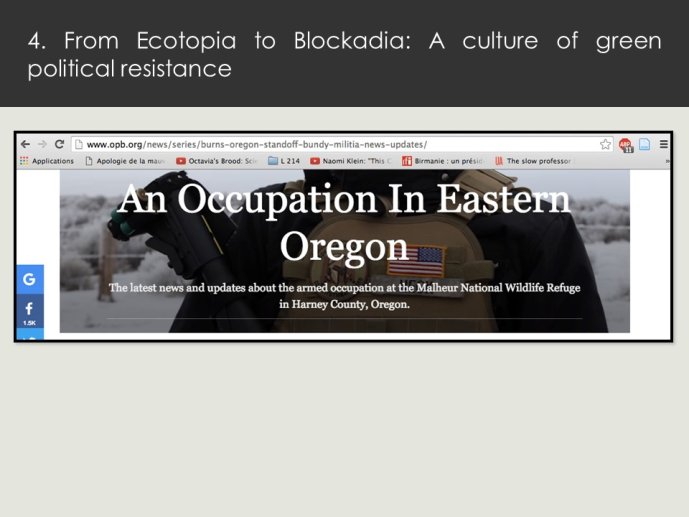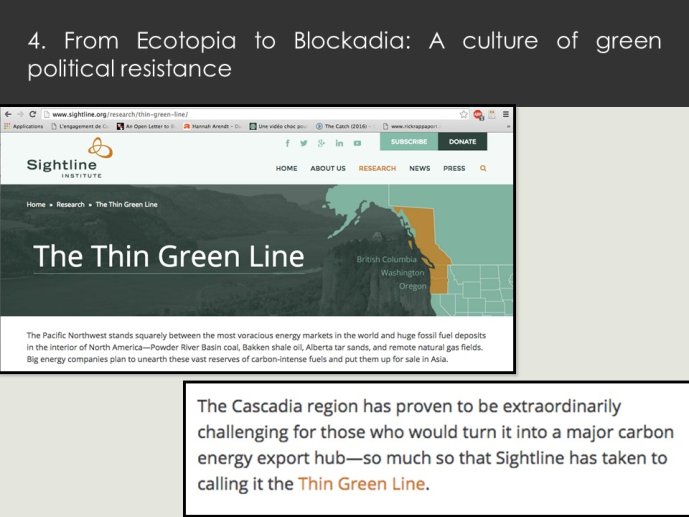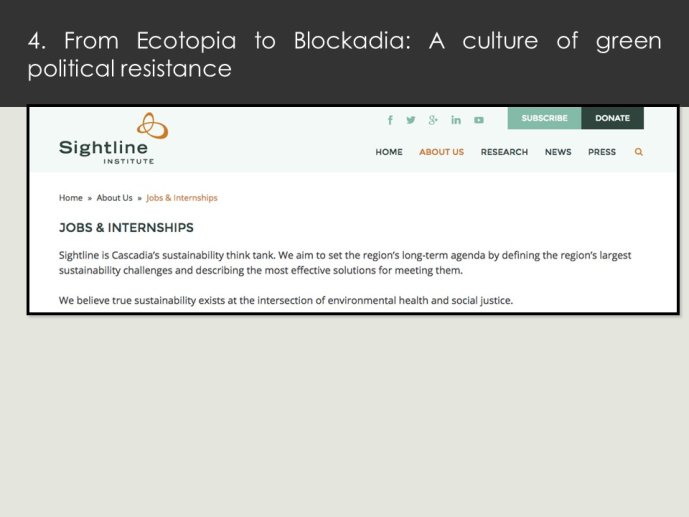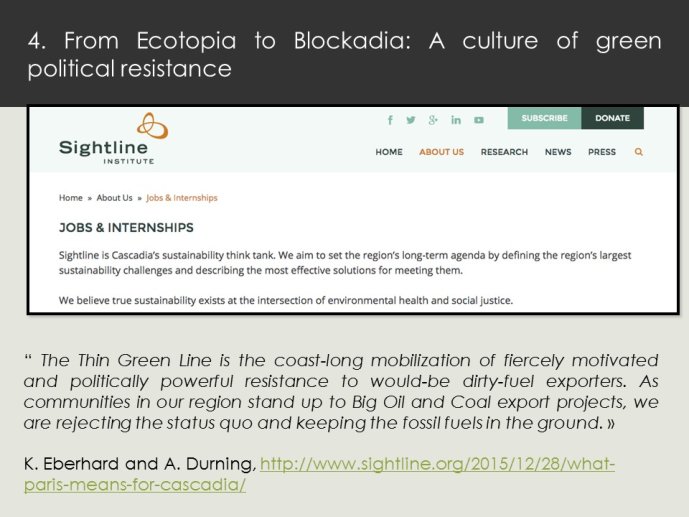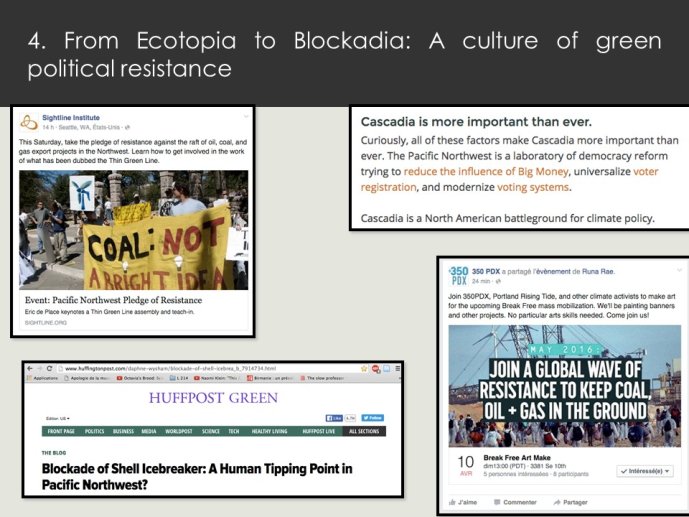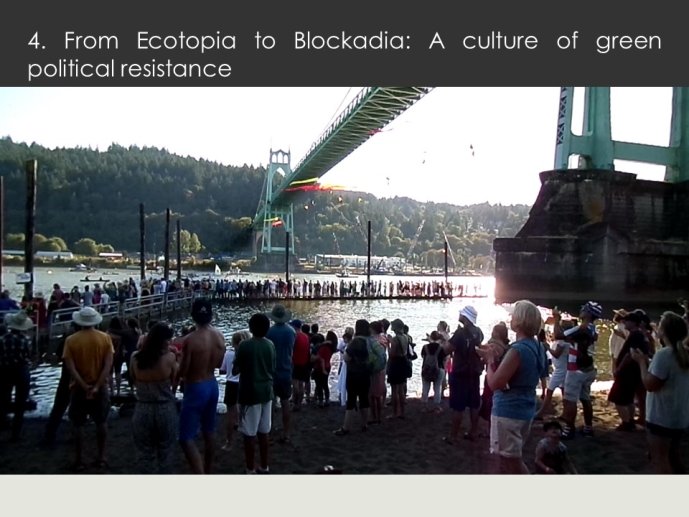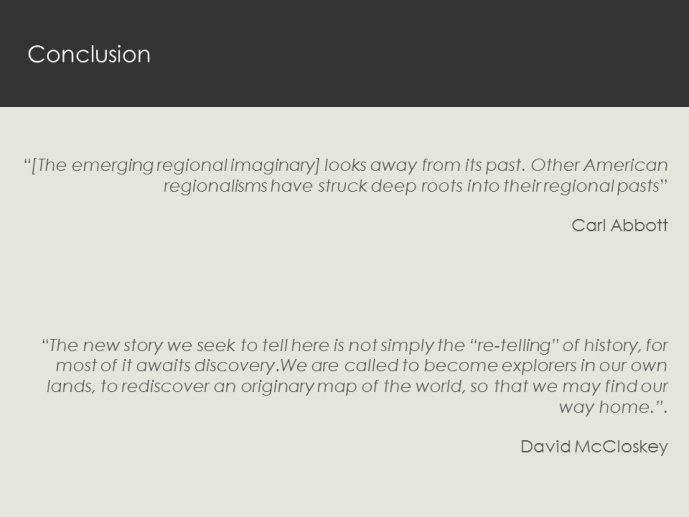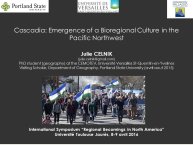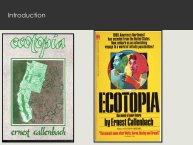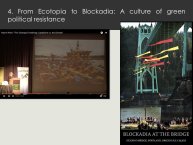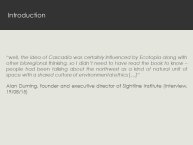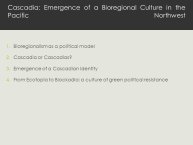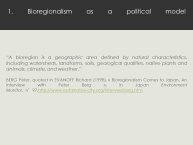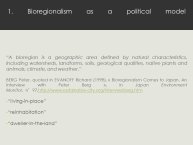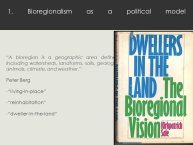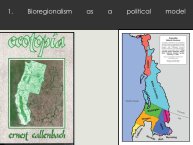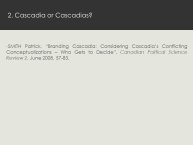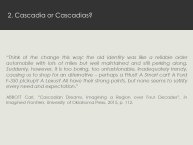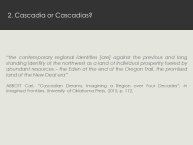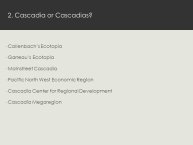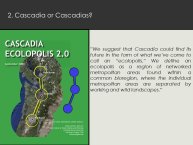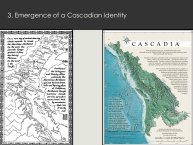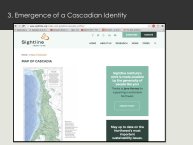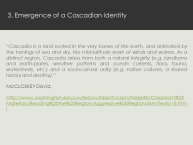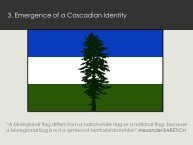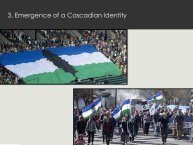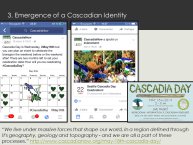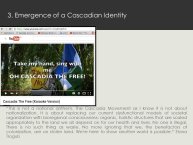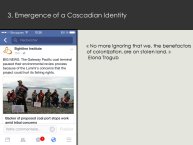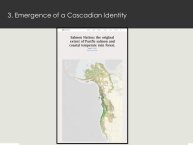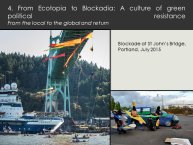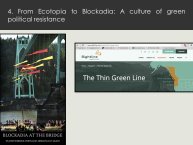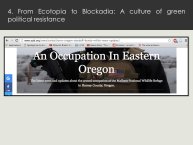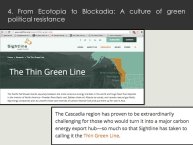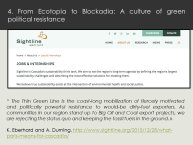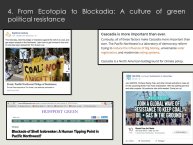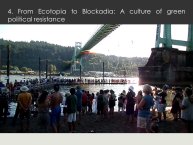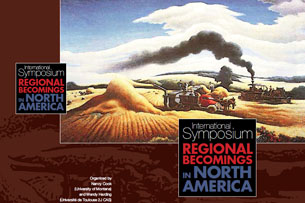Notice
Cascadia: Emergence of a Bioregional Culture in the Pacific Northwest / Julie Celnik
- document 1 document 2 document 3
- niveau 1 niveau 2 niveau 3
Descriptif
Cascadia: Emergence of a Bioregional Culture in the Pacific Northwest / Julie Celnik, in symposium international "Regional Becomings in North America" organisé, sous la responsabilité scientifique de Wendy Harding (Cultures Anglo-Saxonnes (CAS), Université Toulouse Jean Jaurès, France) et Nancy Cook (University of Montana, USA), Université Toulouse Jean Jaurès, 7-8 avril 2016.
Session 2: Bioregional Becomings II.
The Pacific Northwest is known as the greenest part of North America – literally, with the Evergreen Forest, but also culturally, with a strong environmental awareness. Both Callenbach and Garreau, in the 1970-80’, described this region as a place where people live in harmony with nature. The region that they referto as “Ecotopia” in their fictions is today identified by a growing number of people as the Cascadia bioregion.
To what extent the cultural practices in the Pacific Northwest are not only becoming regional, but bioregional? The Cascadia Flag, the Cascadia Poetry Festival, the Cascadia Soccer Cup, the Cascadia Forest Defenders are some among many examples of a Cascadian identity.
This presentation will focus on the culture of green political resistance which newly gave to this region the nicknames “Blockadia” (Naomi Klein) and “Thin Green Line” (Sightline Institute). These practices, sometimes very confrontational (direct action), are embedded into a bioregional approach that tries to connect global issues (like climate change)and local adaptations. By creating resilient communities, bioregionalism helps redefining the regional identity of the Pacific Northwest, as becoming Cascadian.
Intervention
Thème
Documentation
Bibliographie indicative
Abbott, Carl. Cascadian
Dreams. Imagining a Region
over Four Decades, in
Imagined
Frontiers : Contemporary America and Beyond, Norman (OK) : University of
Oklahoma Press,
2015, 270 p.
Berg, Peter, Evanoff, Richard. Bioregionalism
Comes to Japan.
An Interview with
Peter Berg, Japan Environment Monitor, 97, june 1998. [En ligne : http://www.sustainable-city.org/intervws/berg.htm].
Bertens, Johannes Willem. Theo D’. Haen, and Ineke Bockting, eds. ‘Writing’ Nation and ‘writing’ Region in America. Vol. 33. Amsterdam : VU UP, 1996. Print. European Contributions to American Studies.
Brodhead, Richard H. Cultures of Letters : Scenes of Reading and Writing in Nineteenth-century America. Chicago : U of Chicago, 1993. Print.
Campbell, Neil. The Cultures of the American New West. Chicago : Fitzroy Dearborn, 2000. Print.
Campbell, Neil. The Rhizomatic West : Representing the American West in a Transnational, Global, Media Age. Lincoln : U of Nebraska, 2008. Print.
Celnik, Julie. Parcs naturels et environnementalisme, in Frédéric Leriche (dir.), Géographie d’une grande puissance : les Etats‐Unis, Paris : Éditions Armand Colin, coll. Collection U. Géographie, 2016, 319 p.
Celnik, Julie. L’environnementalisme américain à San Francisco, in David Giband (dir.), L’Amérique du Nord au XXIème siècle : enjeux, défis et perspectives, Paris : Éditions Ellipses, 145-157.
Clifford, James. Routes : Travel and Translation in the Late Twentieth Century. Cambridge, MA : Harvard UP, 1997. Print.
Crow, Charles L., ed. A Companion to the Regional Literatures of America. Oxford : Blackwell, 2003. Print.
Deleuze, Gilles, and Félix Guattari. A Thousand Plateaus : Capitalism and Schizophrenia. Minneapolis : U of Minnesota, 1987. Print.
Fetterley, Judith, and Marjorie Pryse. Writing out of Place : Regionalism, Women, and American Literary Culture. Urbana : U of Illinois, 2003. Print.
Foote, Stephanie. “Local Knowledge and Women’s Regional Writing.” The Cambridge History of American Women’s Literature. Ed. Dale Bauer. Cambridge and New York, 2012.
Frampton, Kenneth. “Towards a Critical Regionalism : Six Points for an Architecture of Resistance.” Postmodern Culture. Ed. Hal Foster. London : Pluto, 1985. 16-30. Print.
Franklin, Wayne, and Michael Steiner. Mapping American Culture. Iowa City : U of Iowa, 1992. Print.
Herr, Cheryl. Critical Regionalism and Cultural Studies : From Ireland to the American Midwest. Gainesville : U of Florida, 1996. Print.
Jones, Karen R., and John Wills. American West : Competing Visions. Edinburgh : Edinburgh UP, 2009. Print.
Jordan, David. New World Regionalism : Literature in the Americas. Toronto : U of Toronto, 1994. Print.
Kirkpatrick, Sale. Dwellers in the Land: The Bioregional Vision. Athens GA) : University of Georgia Press, 2000, 248 p.
Klein, Naomi. Tout peut changer. Capitalisme et changement climatique. Arles : Édition Actes Sud/Lux, 2015, 640 p. / Klein, Naomi, This Changes Everything: Capitalism vs. the Climate. New York: Simon & Schuster, 2015, 576 p.
Kollin, Susan. Postwestern Cultures : Literature, Theory, Space. Lincoln : U of Nebraska, 2007. Print.
Lippard, Lucy R. The Lure of the Local : Senses of Place in a Multicentered Society. New York : New, 1997. Print.
Mahoney, Timothy R., and Wendy J. Katz, eds. Regionalism and the Humanities. Lincoln : U of Nebraska, 2008. Print
McGinnis, Michael Vincent, ed. Bioregionalism. London : Routledge, 1999. Print.
Powell, Douglas Reichert. Critical Regionalism : Connecting Politics and Culture in the American Landscape. Chapel Hill : U of North Carolina, 2007. Print.
Smith, Patrick. J. Branding Cascadia: Considering Cascadia’s Conflicting Conceptualizations–Who Gets to Decide”, Canadian Political Science Review, 2, June 2008, 57-83. [En ligne : https://ojs.unbc.ca/index.php/cpsr/article/viewFile/63/89].
Soja, Edward W. Postmodern Geographies : The Reassertion of Space in Critical Social Theory. London : Verso, 1989. Print.
Thayer, Robert L. LifePlace : Bioregional Thought and Practice. Berkeley : U of California, 2003. Print.
Wilson, Chris, and Paul Erling. Groth, eds. Everyday America : Cultural Landscape Studies after J.B. Jackson. Berkeley : U of California, 2003. Print.
Dans la même collection
-
Always Becoming Bioregional / Tom Lynch
LynchTomAlways Becoming Bioregional / Tom Lynch, in symposium international "Regional Becomings in North America" organisé, sous la responsabilité scientifique de Wendy Harding (Cultures Anglo-Saxonnes (CAS)
-
Evolution of the Ecotopian Myth in the Pacific Northwest into a Culture of Sustainability / Steven …
JohnsonSteven ReedEvolution of the Ecotopian Myth in the Pacific Northwest into a Culture of Sustainability / Steven Reed Johnson, in symposium international "Regional Becomings in North America" organisé, sous la
-
Playing Pioneer Woman / Margaret D. Jacobs
JacobsMargaret D.Playing Pioneer Woman / Margaret D. Jacobs, in symposium international "Regional Becomings in North America" organisé sous la responsabilité scientifique de Wendy Harding (Cultures Anglo-Saxonnes (CAS
-
Going Local and Getting Personal: Toward a Regional Reading Practice / Nancy Cook
CookNancyGoing Local and Getting Personal: Toward a Regional Reading Practice / Nancy Cook, in symposium international "Regional Becomings in North America" organisé sous la responsabilité scientifique de
-
Jayne Anne Phillip’s Poetic Reinvention of Appalachia in MotherKind / Sarah Dufaure
DufaureSarahJayne Anne Phillip’s Poetic Reinvention of Appalachia in MotherKind / Sarah Dufaure, in symposium international "Regional Becomings in North America" organisé sous la responsabilité scientifique de
-
Geographies and Genealogies : Jane Smiley, Marilynne Robinson and Louise Erdrich
OlsterStacey MicheleGeographies and Genealogies: Jane Smiley, Marilynne Robinson and Louise Erdrich / Stacey Olster
-
Becoming Californian through Travel and Writing, Friendship and Patronage / Cathryn Halverson
HalversonCathrynBecoming Californian through Travel and Writing, Friendship and Patronage / Cathryn Halverson, in symposium international "Regional Becomings in North America" organisé sous la responsabilité
-
Notes from California’s Native Daughters / Audrey Goodman
GoodmanAudreyNotes from California’s Native Daughters / Audrey Goodman, in symposium international "Regional Becomings in North America" organisé sous la responsabilité scientifique de Wendy Harding (Cultures

